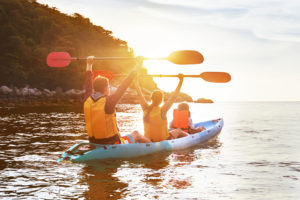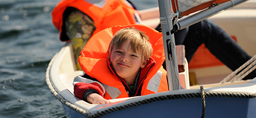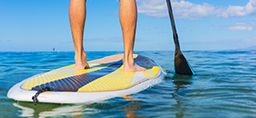
Michigan’s beautiful lakes have always made it a boater’s paradise.
The Great Lakes State boasts 40,175 square miles of water. Only Alaska has more, at 94,743 square miles.
That means Michigan also has much higher boat ownership rates than most of the country. About 22% of all Michigan households own some sort of boat, jet ski, canoe, kayak or paddleboard.
Anticipating a post-pandemic push to get back on the water, safety experts say parents and children need to approach this boating season a little differently.
Drownings top the list of worries, said Erica Michiels, MD, who specializes in pediatric emergency medicine at Spectrum Health.
For kids 14 and younger, drowning is the second-leading cause of death, behind motor vehicle accidents. When excluding for deaths as a result of birth defects, drowning is the most common cause of death in the 1- to 4-year-old age group, according to the Centers for Disease Control and Prevention.
Some studies have already found drowning incidents are on the rise in the Great Lakes, with a spike in incidents reported last summer on Lake Huron, Lake Michigan and Lake Ontario.
Beyond this, plenty of other things can go wrong on the lake, turning a day of water fun into a scary trip to the emergency room.
Boats frequently collide with other recreational vehicles, according to the U.S. Coast Guard, which tracks national and state statistics for recreational boating.
Sometimes people are struck by propellers. There are water skiing, wake surfing and tubing mishaps, engine fires and plenty of bad sunburns.
Parents can prevent many of these accidents by focusing on four areas.
1. Make life jackets a priority
Michigan law requires all children younger than 6 to wear a properly fitted life preserver while on the deck of a boat. Boats also need a life preserver available for every person.
“Most people do a good job of following those regulations,” Dr. Michiels said.
But she thinks it’s essential for everyone in the family to wear a life jacket, no matter what.
“People often think, ‘I’m a good swimmer, I could rescue my kids,’ or, ‘Oh, my kid can swim,'” she said. “But how well can anyone swim if they just hit their head in a collision? Or if they are thrown from the boat, unconscious?
“And many boat accidents happen so fast,” she said, “so there’s little time to react.”
Cold water, especially in Lake Superior, adds another risk, she said.
“That causes an immediate hyperventilation response, which can cause people to pass out,” she said. “It can also cause them to breathe so fast that they take in water.”
It’s especially important for teens to see adults wearing life jackets.
“They are often just doing what their parents do,” she said. “But because they have so much less experience operating boats, it’s much more dangerous for them to go without a vest.”
The Coast Guard estimates that life vests could help prevent 80% of all boating fatalities.
Make sure the vest fits right. Check the label for weight or chest size recommendations, according to the Boat U.S. Foundation. Have your child try it on, buckling and tightening all straps. Ask your child to raise her arms, then gently pick her up by the top of the life jacket arm openings.
If it rides up above her ears, it’s too big.
2. Get schooled in regulations
Learn more about boater safety in Michigan. If you plan to let your teen boat alone, insist they take a safety course.
“We do so much with teaching teens drivers ed, but because boating is done on the wide-open water, parents worry less,” Dr. Michiels said.
But just as teens are more likely to be involved in car accidents, they’re more apt to have boating collisions, too.
Jet skis, which can go as fast as 50 mph, can be especially dangerous.
The sharp increase in boat sales during the pandemic—a jump of more than 9% in 2020—makes this more important. While it’s great that more families are out there enjoying the water, it also means there are potentially more inexperienced sailors, creating hazards for everyone.
3. Don’t drink and boat
As tempting as it may be to pack that cooler of beer, reconsider. Alcohol is the most common contributing factor in boating accidents, according to the Coast Guard.
That doesn’t just apply to those operating the boat, but other adults who can easily be distracted from supervising children.
“Watch how people behave on a pontoon boat,” she said. “The adults step on, crack a beer and start enjoying themselves, often forgetting that kids can be especially unpredictable in situations they’re not used to.”
4. Stay focused
It’s vital for people to remember that drowning is called a “silent killer.”
“If your child falls in the water and starts to struggle, you won’t hear her,” Dr. Michiels said. “She’ll be using all her energy to try and stay afloat—she won’t be able to scream.”
It’s smart to constantly remind yourself that you are your child’s most important safety role model.
“Kids mimic adults,” she said. “The more grown-ups model safe behavior in boats, the more likely they are to have an impact on kids.”
 /a>
/a>
 /a>
/a>
 /a>
/a>